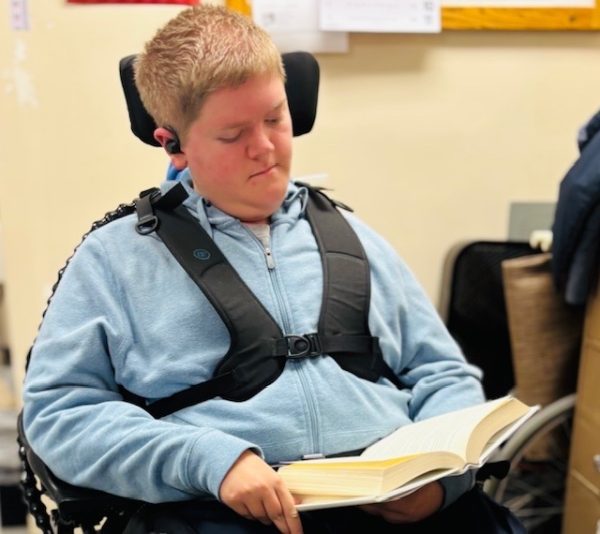“No phone” policy starts today as part of pilot
Depending on their classes, freshmen through juniors will have restricted access to their cell phones during the school day
Starting today a new “no phone” policy will be tested by 25 teachers before it’s put in place school wide next year.
The new rule will require students to keep their phones in a safe place, either a backpack or a phone pouch provided by a teacher if the student doesn’t carry a backpack. During this period of the rollout, the procedures will not include advisement or study hall. The only teachers piloting it during fourth quarter will be 9, 10, and 11 grade teachers since seniors will be leaving when the policy is fully in place.
An email was sent by Principal Darren Rasmussen to parents and guardians on March 6 detailing the plans of this rollout. He said that AirPods and other headphones will also be included in the policy.
“The expectation of students entering the classroom is that personal cell phones and non-district electronic devices are put away in their backpack on silent or powered off,” Rasmussen wrote in the email. “These devices should not be visible to the student or teacher. This includes earbuds or headphones.”
In the email Rasmussen stated that the student will first be asked to put their device away and then administrative action will be taken. Rasmussen said in the statement that the policy isn’t meant to cause problems between students and authority figures.
“Let us reiterate that our goal is not to confiscate cell phones and create additional power struggles with students and families,” Rasmussen wrote. “Our goal is to preserve the best instructional learning environment that we can and we believe that students will perform better, achieve at higher levels and have better learning experiences in our classroom.”
One teacher testing the policy with his junior classes is history teacher Anthony Razor. Razor teaches AP European History and AP World History. He believes that phones make a drastic impact on the learning environment.
“I have always wanted a firm policy on cell phones. Phones cause problems,” Razor said. “They are a distraction and, unfortunately, I have seen too many times where a phone has been used and weaponized against a student through pictures, recordings, stealing and so many other things.”
Razor also says that screens in general take away from kids’ ability to learn, and thinks that this policy will help decrease the distractions created by them.
“At the very least, it will focus students,” he said. “All the science shows us that staring at a phone decreases the ability for students to focus in class and think as watching a screen is mentally exhausting. Screens require rapid eye movement not mimicked in nature and that makes eyes and brains tired. Teachers can’t compete with a box of flashing lights so that box zaps all the mental energy that would otherwise be used in the classroom. Performance can only go up with this. As one student said when I brought it up ‘I know its going to be good for me, but I just don’t want to.’ Kids know it.”
Students will also not be able to have their headphones in during class with the new policy. Razor agrees with this addition.
“The number of times I will try talking to a kid and they don’t understand or ask the same question over again because their headphone is their focus is frustrating,” he said. “I talk, a lot. So if you have headphones in, you are missing something like 50% of everything taught in class. That’s a big void. And that is easily seen on assignments and tests. Performance can only go up. As Rasmussen has said, you can talk to your friends later, in class, you need to be working or learn.”
Fellow history teacher Jarret Widhalm agrees with many of Razor’s opinions, including the policy adding headphones. Widhalm teaches U.S. History and World History to freshmen and juniors.
“I absolutely think it should include headphones and AirPods within the phone policy,” Widhalm said. “During instructional and even work time students miss out on valuable information because they are listening to music or watching videos with their headphones. Many headphones come with noise-canceling modes which makes it impossible to hear anything. When students are in the classroom the goal for them is to be learning and contributing to the class not listening to music.”
Unlike Razor, Widhalm is leaving his junior classes out of the test run.
“I will only be implementing the phone policy in my freshman classes to start the fourth quarter of the school year,” Widhalm said. “As a member of team honor on the freshman academy, we decided to test out the phone policy. Team honor voted to be a part of the trial run starting after spring break. We felt it was important to be consistent in our team and all be a part of this change.”
Students are also often in class on their phones while also attempting to retain information, and Widhalm says this doesn’t work as well as students think.
“Many students who think they can multitask really cannot, or cannot as well as they think they can,” Widhalm said. “Like everything in education, it does vary by each kid as some kids use their phones as a source of information but overall I think it has a negative effect. ”
Widhalm also cited missed opportunities to connect with classmates due to the presence of phones in the classroom.
“I struggle with this [gaining students’ attention] every day. As much as I love history and try to engage all of my students I will never be as interesting as the newest show on Netflix or any videos from TikTok,” Widhalm said. “Phones can be a great tool for finding more information; however, it has turned into more of a distraction than anything else. I also think students miss out on social opportunities within the class when the cellphones come out as they are not forced to engage and critically think about content with their classmates.



